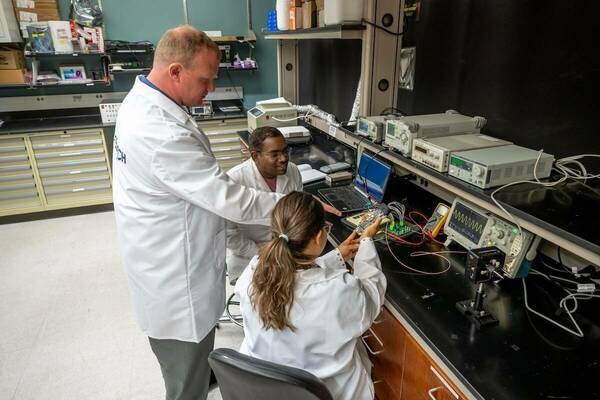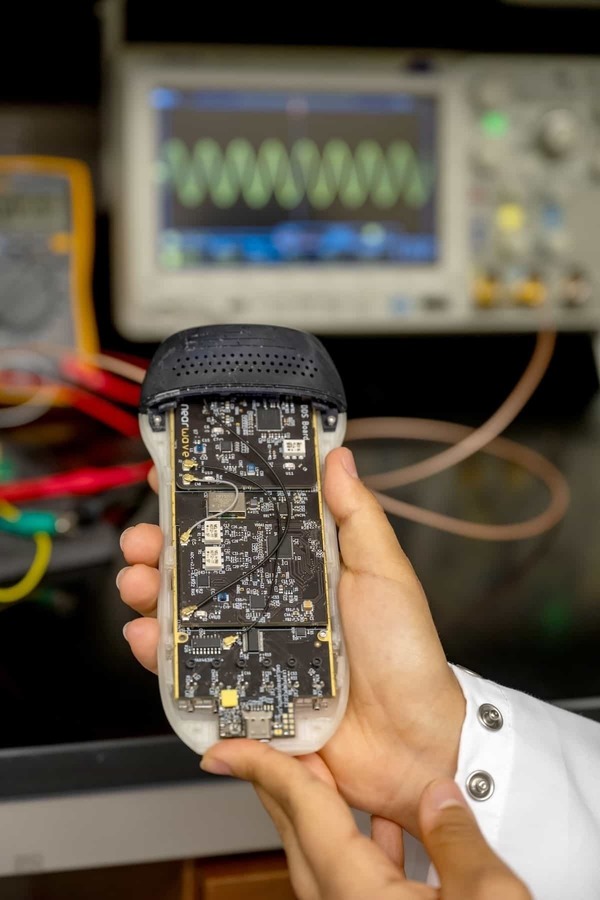
Researchers at the University of Notre Dame and the Instituto Tecnológico y de Estudios Superiores de Monterrey, School of Medicine and Health Sciences in Mexico have received an award from the Indiana Clinical and Translational Sciences Institute (CTSI) and the IU Center for Global Health Equity’s Reciprocal Innovation Grants Program for their research, which works to improve breast cancer diagnostics for thousands of women in limited-resource communities.
The CTSI Global Health Reciprocal Innovation Demonstration award recognizes projects that offer a “bi-directional and iterative exchange of a technology, methodology, or process between at least two countries, one lower- or middle-income country and one high-income country, to address a common health challenge.”
Thomas O’Sullivan, associate professor of Electrical Engineering in the College of Engineering at the University of Notre Dame, is the principal investigator for the project, “Accuracy and acceptance of handheld noninvasive optical spectroscopy for breast cancer diagnosis in Mexico.” O’Sullivan’s current work focuses on NearWave, a battery-powered imaging device developed in his lab to characterize breast lesions. Now, O’Sullivan is evaluating NearWave for use in settings where health resources are limited.
In the United States, two of every three breast biopsies are benign, resulting in unnecessary anxiety, pain, and health costs. At the same time, in limited-resource communities, alternatives to mammography have demonstrated high false-positive rates, placing significant demands on health systems’ limited resources. There is an urgent need for advancements in diagnostic tools that can more effectively identify breast tissue abnormalities prior to a biopsy order.
The CTSI award will support O’Sullivan’s work to optimize a breast diagnostic imaging procedure in low and middle-income settings in Mexico, evaluate the accuracy of breast malignancy diagnosis in patients scheduled for a breast biopsy, and gather clinical and cultural feedback while using the NearWave device. O’Sullivan is working with Dr. Daly Avendaño, adjunct researcher and breast radiologist for the School of Medicine and Health Sciences at the Tecnológico de Monterrey.

“Working with our partners at the Instituto Tecnológico y de Estudios Superiores de Monterrey to develop and perform this pilot study is instrumental in evaluating the device’s accuracy for use in wider international clinical settings,” says O’Sullivan. “Through this award from the Indiana CTSI, I look forward to advancing health standards for marginalized communities with limited access to care.”
O’Sullivan is an affiliated faculty of the Eck Institute for Global Health (EIGH). The EIGH, in partnership with the Harper Cancer Research Institute (HCRI) and Notre Dame Mexico, also provided awards to extend the NearWave pilot study into Mexico. The EIGH and HCRI actively support translational research for investigators who, like O’Sullivan, are committed to providing positive health impact in resource-limited communities.
Nydia Morales-Soto, assistant director leading research and partnership efforts at the Eck Institute for Global Health is the co-principal investigator on the project. “With the support of the Indiana CTSI’s Global Health Reciprocal Innovation Demonstration award, we are thrilled to see this project move forward,” she says. Morales-Soto recently collaborated on a five-year review of reciprocal innovation programs. “By addressing global health concerns through reciprocal and translational research, and by strengthening our partnerships in Mexico, we are working together as a force for good to improve health standards for women facing breast cancer here in Indiana, and around the world.”
For more information about this project and about O’Sullivan’s biomedical photonics laboratory, please visit the O’Sullivan Research Group website.
To learn more about the Indiana CTSI, please visit the website.
Contact:
Christine Grashorn, Communications Specialist
Notre Dame Research / University of Notre Dame
cgrashor@nd.edu / 574.631.4856
research.nd.edu / @UNDResearch
About the Eck Institute for Global Health
The Eck Institute for Global Health (EIGH), an integral part of Notre Dame Research, builds on the University’s historical strength in infectious disease research, including vector-borne diseases, while broadening the interdisciplinary expertise into other key global health areas including maternal, newborn, & child health (MNCH), community health, mental health, nutrition and non-communicable diseases, the environment and health, health analytics and technologies, and health systems and organizations. Our team of interdisciplinary researchers and their students holistically address health disparities around the world. EIGH faculty affiliates recognize health as a fundamental human right and promote research, training, and service to advance health standards for all people, especially those in resource-poor countries who are disproportionately impacted by preventable diseases. The EIGH is training the next generation of global health researchers and leaders through undergraduate, Master of Science in Global Health, doctoral, and postdoctoral programs.
About the Harper Cancer Research Institute
Investigators in the Harper Cancer Research Institute (HCRI) are dedicated to conducting innovative and integrative research that confronts the complex challenges of cancer. Our programmatic structure fosters multi-disciplinary cancer research by promoting interactions among research groups with distinct expertise and by training early career scientists to work across scientific fields. Clinical partnerships provide key translational insight and strengthen the mission of discovery. Collaboration is a foundational principle of the Institute. Harper research teams are comprised of faculty from multiple departments within the College of Science, College of Engineering, and the College of Arts and Letters at Notre Dame in addition to IUSMSB faculty.
About the Indiana CTSI
The Indiana Clinical and Translational Sciences Institute (CTSI) is a statewide research partnership among Indiana University, Purdue University, the University of Notre Dame, and Regenstrief Institute, along with a number of life sciences organizations, governmental entities, and community groups. The Indiana CTSI also engages with the public at every level of research—from basic science to patient care. It has been continuously funded by multimillion-dollar grants from the National Institutes of Health since the Indiana CTSI’s founding in 2008 and is housed at the Indiana University School of Medicine.
Originally published by at research.nd.edu on September 03, 2024.